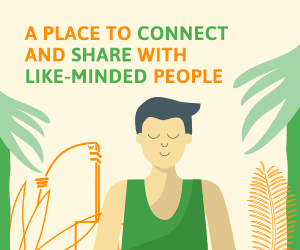Getting things off our chest and sharing helps us feel better, we’re told. However, what about the shame or fear of judgment that can sometimes follow? Sonia Vadlamani explains what causes this initial regret – known as a vulnerability hangover – and how to overcome it.
Most of us have felt vulnerable whilst expressing our emotions at some point. We may have silently admonished ourselves for revealing too much on a date or at a dinner party, a heartfelt birthday card that we regret spending time on as soon as it’s gifted, or a poem or Instagram post penned with wholehearted emotion that feels too raw once published or shared. In most scenarios like these, a feeling of regret sweeps over us, leaving us feeling guilty for over-sharing.
As an ‘extroverted’ introvert, I feel the need to build deeper connections, yet be in control of my environment all the time. This often makes sharing personal views and experiences difficult for me. It’s the same whenever I write an article or blog post and publish it for the world to view. For me, my vulnerability hangover is the feeling of exclaiming “Aarghh! What did I do” or “What was I thinking!” out loud to myself, when I recollect a moment that made me feel emotionally exposed.
So, what is a vulnerability hangover?
Coined by renowned storyteller and researcher Dr Brené Brown, a vulnerability hangover is the gut-wrenching feeling of shame and fear that pops right after we undertake an emotional risk. It refers to the aftermath we experience in the form of an ‘emotional cringe’ upon deciding to put ourselves out there.
A vulnerability hangover is also mentally exhausting and can last between a few hours to several days, depending on how risky a revelation or sharing one has considered it to be. While the original motive behind opening up is to gain support and form fulfilling connections, the vulnerability hangover makes us wish that we had never revealed a part of our personality, or that we could go back in time and undo the action that makes us question ourselves now.
Why do they happen?
If vulnerability hangovers don’t mean the end of the world, one may wonder why we suffer with doubt and anxiety over opening ourselves up in the first place. Most of the time, we feel vulnerable because as we reveal our personal aspects to make meaningful connections, we’re also potentially subjecting ourselves to being evaluated and rejected.
“Coined by renowned storyteller and researcher Dr Brené Brown, a vulnerability hangover is the gut-wrenching feeling of shame and fear that pops right after we undertake an emotional risk.”
Although many people still misguidedly see vulnerability as a weakness, in fact, it can be an act of courage and innate strength. After all, emotional vulnerability involves taking a risk wherein you can’t possibly predict or control the outcome, such as sharing your feelings, signing up for a new adventure, presenting an idea or showcasing your creative abilities. According to Dr Brown, vulnerability is what you may feel “any time you put yourself out there when there’s a chance it can all go to hell”.
How to deal with a vulnerability hangover
Indeed, vulnerability hangovers may cause regret and embarrassment, but this doesn’t mean you shouldn’t create situations which make you feel vulnerable. In fact, licensed clinical psychologist Dianne Grande stresses that emotional vulnerability is fundamental for building connections. Instead of trying to numb it as is our first instinct, recognizing vulnerability as an act of bravery and embracing it can change our lives for the better.
Overcoming vulnerability can help you lead a life without regret, and here are a few effective ways to deal with those emotional hangovers that may arise:
1.Identify your feelings and emotions
While it may seem counterintuitive, being aware of the emotions which make you feel vulnerable and understanding the underlying reasons, is the steadiest way to tide over a vulnerability hangover. However, it needs you to be painfully self-aware even while you’re letting go, which could be unsettling at first. Start by patiently labelling the thoughts, emotions, beliefs, and actions which provoke reactions that seem to trigger a vulnerability hangover for you.

Dont' feel shame: vulnerability is a positive trait
2. Adjust your perspective and reconsider the scenario
Another effective method to stop worrying and free your mind of fear of judgment and embarrassment is to mentally zoom out or step back and consider the scenario afresh. Is someone really judging you for the views you expressed, or are you simply imagining they might judge you for the same?
Use acceptance to prepare yourself for all the possibilities. Indeed, your views may be rejected, or you may get fired for asking for that much-needed promotion at work, but there is an equal chance that you will achieve the objectives you set out to accomplish in the first place if you approach these in a level-headed manner.
3. Define your ‘why’ and set mental reminders
One of the reasons for me to keep writing and narrating my stories was to reach out those who feel vulnerable – just like I do – while discussing their personal struggles, be it trying to get fitter, build strength, eat healthier and find happiness through gratitude.
Being vulnerable can seem akin to stirring up a hornet’s nest, thus creating discomfort, and even inducing anxiety for some individuals, which is why it’s important for you to know why you took the risk in the first place.
• JOIN US! Sign-up to happiness.com and connect with our caring community •
It helps to write down your aspirations and then break them down into SMART goals, so that you can remind yourself of why you need to put yourself out there, thus transcending mental barriers of shame and guilt. I keep reminding myself about my ultimate goal to lead a happy, meaningful life with authenticity, which makes the risk of being vulnerable endurable for me.
4. Find your safe space
Sometimes, it’s necessary for us to just unburden our mental load to be able to feel heard and supported, and to pave the way forward. However, some discretion is advised. In the words of Dr Brown, “Our stories are not meant for everyone. Hearing them is a privilege, and we should always ask ourselves this before we share: Who has earned the right to hear my story?”
“While it may seem counterintuitive, being aware of the emotions which make you feel vulnerable and understanding the underlying reasons, is the steadiest way to tide over a vulnerability hangover.”
As discussed before, self-disclosure is a nuanced process that should be done with a specific objective in mind. Indeed, finding your ‘tribe’ or making new friends by sharing your most authentic self with those around you is a positive outcome that makes the endeavor through shame and guilt worth it.

Oversharing can sometimes leave us feeling vulnerable shutterstock/khosro
5. Change your self-talk
Indeed, with social media intervening in our personal lives all the time, it’s easy to feel judged or rejected for even the tiniest snippets you share from your personal life. Learning to embrace imperfections in yourself as well as others will help you avoid the perfection trap, and allow you to stop ruminating and take action, even if it makes you feel vulnerable.
In addition, practising self-compassion makes it easier for one to overcome vulnerability hangover, as it helps us see empathy as the antidote to shame.
6. Keep it up till you feel more comfortable sharing
“I wouldn’t found a Museum of Daring Greatly. I would found a Museum of Epic Failure,” replied Dr Brown when asked about building a monumental structure where she could display the greatest risks she ever took, and what she'd put on display there.
Developing shame resilience can prove useful for overcoming vulnerability hangover as well, as this focuses on the feelings which create the opposite effect of shame, like joy, connection, empathy, confidence, etc. Once you embrace the fact that growth comes from a place of discomfort and failures, rather than a place of ease, you can start embracing vulnerability as an essential part of growth.
Roundup: vulnerability hangovers
Vulnerability is the “birthplace of love, belonging, joy, courage, empathy, and creativity”, says Dr Brown, and it also acts as the strengthening force in loving relationships. Sadly, there is no fast-acting pill or quick mantra to overcome vulnerability hangover – we just must acknowledge that vulnerability is a ‘necessity’, even though utterly uncomfortable at most times. Being vulnerable can help us to forge more real connections and result in a greater sense of self-acceptance. •
Main image: shutterstock/Golubovy
happiness.com | The fine art of being: learn, practise, share
Are you a happiness.com member? Sign up for free now to:
■ enjoy our happiness magazine
■ share and support in our happiness forum
■ develop with free online Academy courses
Written by Sonia Vadlamani
 Fitness and healthy food blogger, food photographer and stylist, travel-addict and future self journaler. Sonia loves to write and has resolved to dedicate her life to revealing how easy and important it is to be happier, stronger and fitter each day. Follow her daily pursuits at FitFoodieDiary or on Instagram.
Fitness and healthy food blogger, food photographer and stylist, travel-addict and future self journaler. Sonia loves to write and has resolved to dedicate her life to revealing how easy and important it is to be happier, stronger and fitter each day. Follow her daily pursuits at FitFoodieDiary or on Instagram.

Join the conversation
You are posting as a guest. If you have an account, sign in now to post with your account.